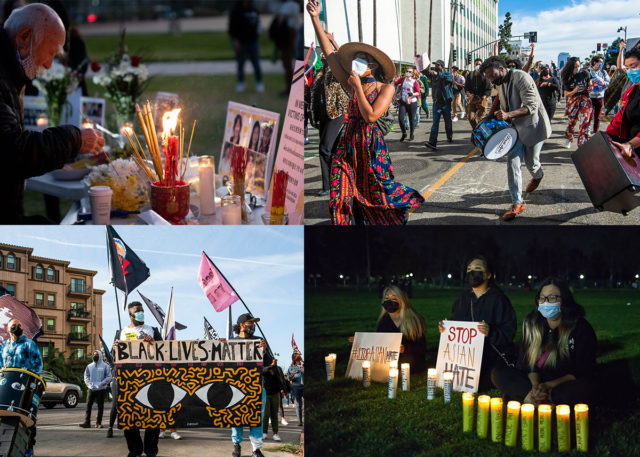Social justice protests across Los Angeles have seen progress for their demands, but their work is not complete, some community leaders and advocates said.
Hundreds marched around the city for the Black Lives Matter movement after George Floyd’s death in Minnesota police custody last year. Months later, demonstrators took the streets again for Stop Asian Hate after a string of nationwide attacks against Asian Americans.
[Related: Gallery: Students march through UCLA in support of Black Lives Matter movement]
“It’s not enough to hit the streets in mass numbers,” said Joseph Williams, a Black Lives Matter Los Angeles organizer. “The lack of transformative change after those massive uprisings tells us that.”
The past year saw thousands of individuals take to the streets for social justice, but numbers at regular protests have gradually decreased, Williams said. While crowds swelled after publicized tragedies like Trayvon Martin’s death, numbers have generally decreased in the past year, he added.
Individuals who participated in activism for more performative purposes tended not to return to protests over time, said Nana Sarkodee-Adoo, a public health and social welfare graduate student and a member of the Luskin Black Caucus at UCLA, a forum where all students can discuss issues that affect Black Americans and work to create reform.
Williams said despite waning crowd sizes, activists’ calls for reform remained undeterred because protesting is just one part of their policy solutions.
“Protest is how we show our anger and our unhappiness with the system,” Williams said. “But it’s also not what actually changes things.”
Diligent community organizing went hand-in-hand with forming the hundreds-strong crowds at BLM protests throughout 2020, Williams said. Community organizing involves building relationships with community members to pressure public officials to enact policies, which can be more effective at producing change, Williams added.
Williams said these efforts led to criminal justice reform within Los Angeles County. He added that among several goals met, BLM-LA saw a $150 million cut to the LAPD budget last year, the ouster of District Attorney Jackie Lacey, who was seen as ineffective by BLM leaders, and the passage of Measure J, which diverts 10% of community funds to incarceration alternatives.
“None of that would have been possible without consistent organizing and base building,” Williams said.
Large numbers flocking to protests demonstrate the need for change, said Karen Umemoto, an Asian American studies professor, but they don’t solve all the issues, such as the lack of Asian representation in leadership.
While protests are energetic events – as demonstrators chant on the streets for change – it’s important to remain aware of the inequitable conditions that create durable movements, said Jameelah Howard, a social welfare graduate student and member of the Luskin Black Caucus.
Activism disproportionately burdens people of color, Howard said.
“Sustaining that energy is hard,” Howard added. “How do you preserve a piece of yourself? You don’t get an escape, … whether you are protesting or not.”
The BLM movement in 2020 also primed the public to stand in solidarity with Asian Americans following a spike in hate crimes and incidents in the past year, Umemoto said.
Since the pandemic began, reports of hate crimes against Asian Americans surged 145% nationwide and rose 114% in LA from 2019 to 2020, according to the Center for the Study of Hate & Extremism at California State University, San Bernardino.
Over the past year, Angelenos took the streets to celebrate Asian American identity and raise awareness of racism.
[Related: Gallery: Hundreds gather at #StopAsianHate vigils in the San Gabriel Valley]
However, these demonstrations alone are not a solution to combating racism, said Manjusha Kulkarni, the co-founder of Stop AAPI Hate – a center that consolidates hate crimes and incident reports.
In addition to working with protest organizers, the Stop AAPI Hate coalition has been calling for community mental health and immigration resources, a database for documenting hate incidents and the provision of legal recourse for those that face discrimination, Kulkarni said.
Kulkarni added that initiatives such as LA vs Hate offer hotlines for individuals to call and receive proper services after experiencing a hate crime or incident. In April, the LA County Board of Supervisors passed a motion to expand these initiatives by forming a $1 million equity and diversity fund that will explore solutions to combat discrimination against Asian American, Native Hawaiian and Pacific Islander communities.
In addition to gathering at protests, Americans can support the cause by educating themselves about Asian American history, starting a support group or donating to local organizations that provide assistance to victims of racial discrimination, Umemoto said.
“Now is an opportune and important time to build those bridges of support and solidarity,” Umemoto added.

